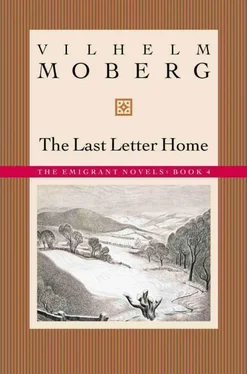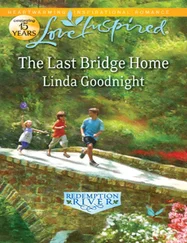He lay on his stomach, his face against the earth. They bent over him. His legs moved a little, his shoulders rose perceptibly. His boot toes scraped against the ground, but his head lay still. But he moved. He was alive.
The sons had been silent as they worked their way toward the father; now they spoke:
“Father! Are you hurt? Can you talk?”
They received not a word in reply, only a deep breath. But when they took him by the shoulders he stirred again. He tried to turn over; slowly, with its own strength, his body turned on its back. Even his head began to move, and the sons saw a face distorted, barely recognizable. It was not cut, no injury was visible, but great puffs of froth showed in the corners of his mouth; his teeth were bared, in a cramp-like bite; his eyebrows were pulled together at the root of his nose, which was poking up at them, enormous, protuberant, like a knot.
“How did it happen? Are you terribly hurt?”
A hissing sound escaped the mouth of the fallen one. He groaned, his teeth clenched so hard it showed in his cheekbones. It was pain that had changed his face.
He felt his back with his hands and groaned again. Then he began slowly to pull up his knees. He could move both arms and legs.
When the sons had first seen him on his stomach, pressed down under the oak, they had not expected him to move again. And as yet they did not know what had happened to him, as yet he said nothing. He rose slowly to his knees, his facial muscles tightening. Again he felt his back, his hands groping about. But his back seemed to be all right; it could not be broken.
The farmer looked about as if in great confusion. He looked at his sons around him, from one to the other, searching for an answer: Was it really true? Could he still move? Then he must be alive. He was alive, and no one was more surprised than he.
He looked at the fallen oak beside him. One of its heaviest limbs had pressed upon his back, and now when he looked closer he understood why he was alive; he had fallen into a small hollow. Without this slim depression his body would have been crushed.
If he hadn’t fallen into that hollow he would never have risen again. If he had happened to fall a foot to the right or a foot to the left he would have remained fallen. If he had taken one step more before he fell he would have been dead.
The farmer said to his sons who stood there apprehensively that he had had a close call. The bough had almost got him. Only a hairsbreadth and they might have had to carry home a corpse this evening.
They stood silent at the thought. Then they asked about his injuries. Did he want them to carry him home?
The father replied that the oak had given him a sound lash across the back and he did not feel well after it. But he thought he could get home on his own legs. If they took the horses and the tools he would try to walk.
Cautiously he attempted to rise from his kneeling position. He wasn’t successful; the attempt caused him such intense pain that everything turned black before his eyes and he felt dizzy. When he tried to move one foot he reeled. He sank down on his knees again.
There was nothing to do but accept the sons’ offer.
They made a litter for their father from a few branches of the oak they had felled, tying them together with the reins. It was a clumsy, primitive litter, but it would hold for the short distance home. There were four of them and each could carry a corner.
So this evening the farmer was carried home by his sons after his last full working day.
— 4—
For a few months Karl Oskar stayed in bed and put plasters on his injured back. A thick blue-black swelling appeared across the small of his back where the oak had hit him. He rubbed the injured part with different kinds of salves for which he sent to the new drugstore in Center City. Some he also mixed himself and with the aid of neighbors. He tried cotton oil and camphor, sheep-fat, pork, unsalted butter. He had leeches put on the swelling — they sat so close, those nasty sucking critters, that they covered his whole back; they drank his blood and swelled up until they were so fat and thick and round they couldn’t suck any more and fell off and died. Rows of itching wounds were left from their sharp bites.
The first weeks in bed he was kept awake through the nights by the pain. It felt like a firebrand in his back. But after repeated applications of leeches the swelling went down, the soreness eased, and the pain abated. He thought the critters had sucked out the evil that caused the pain.
When on that November evening he had heard the oak come down on him so suddenly he had had only one thought: I’m dying! He had time to think of nothing else before he felt the pain and lost his breath. The pressure had been so severe that he was unable to get air into his lungs. His next clear thought had been: Has my back been able to take it? Pressed down under the tree he had felt sure his back was broken.
He had not been stricken as severely as he had expected but he suffered intense pain afterward. He had to stay in bed for a long time. Fortunately it was winter and there was no urgency on the farm. He need not worry about the daily chores; his four sons attended to those.
In time Karl Oskar was up on his legs again. But it was spring before he could go back to work. He began with easier chores, but his back was not the same as before: He had to walk with it bent. As soon as he tried to straighten up, the old pain and ache gave him orders: You aren’t able! Don’t try to lift!
The following autumn Karl Oskar Nilsson and his sons completed the clearing of the oak grove. They stacked the timber, cleared the ground of stumps and roots, and plowed the field; and the father participated all the time in the work. It was his last clearing, he must see it through. Then his farm would be completed.
His injury was healed but his back was not as strong as before the accident. He walked bent over, he couldn’t straighten it, and he was unable to lift heavy objects.
It was evident to him that from now on he would be only half a workman; he could participate in the work, but he couldn’t do what he had done before, nor would he ever be able to. The last tree he felled had marked him for the rest of his life.
The farmer and the oak had fallen side by side. He rose again, but not fully. One ability had been taken from him: He could never again walk upright on earth.
— 5—
A settler’s evening prayer:
Well, God, I guess you think you’ve got me now! But this is not the way to change me. It was a bad blow I got on my back — now I’m stooping. You’re the Almighty, nothing happens without your will. You wanted to hurt my back, to make me suffer from it for the rest of my life. Why? I don’t think I sinned in cutting down the oaks. I like to clear fields, and people get their daily bread from those fields. Is that why you reward me? What did you do to my father in his days? He fought the stones for twenty-five years and then a stone made a cripple of him. That too you allowed to happen, so you rewarded him. You took Kristina from me, you tricked her to die. How can a person trust a God who acts that way? How can anyone ask me to trust in the Lord after this? You gave me a mind — I’ve used it to the best of my ability. But if my sense isn’t good enough — is this my fault? Why wasn’t I given enough sense? I want to tell you, God: I’ll never praise you for what you did to Kristina, for what you’ve done to me. Never. For I do not accept the injustices you allow to happen. I won’t budge. I won’t submit. I’ll always fight against it. Me you cannot coerce. Never will I ask forgiveness. I know I’m a helpless creature before the Almighty. You can do with me what you wish. But never, never will I say it is just. The oak hit me across the back but it didn’t change my mind. If the tree had fallen a foot to the right or to the left I would have lost my life. But it would have made no difference, it would not have changed me in the moment of death. You cannot do anything to change my mind. You’ve bent my body, God, but not my soul. You can kill me, you can rob me of my breath, but you cannot make me say you’re just. You can never bend my soul. Never in eternity. Amen.
Читать дальше












